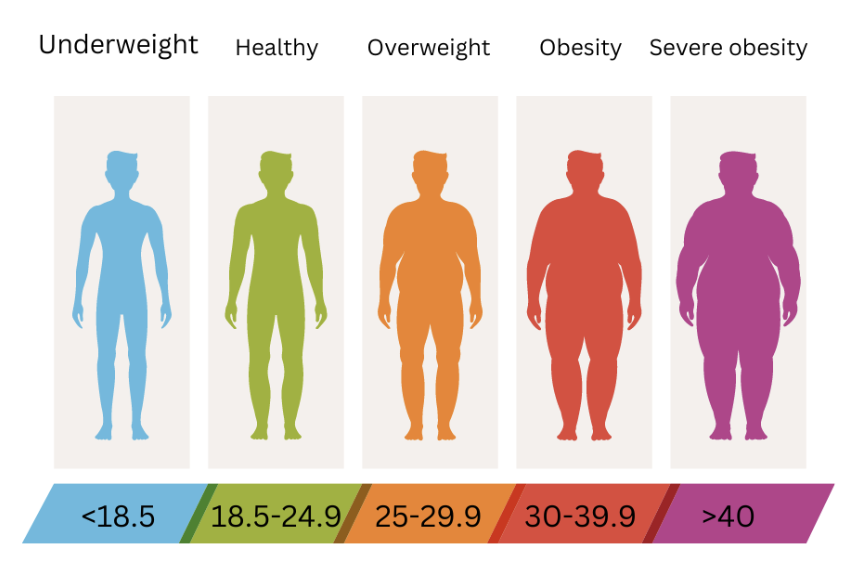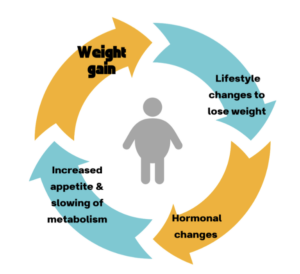What is obesity?
Obesity is a medical condition characterised by an excessive amount of body fat that can negatively impact your health. It affects about a quarter of adults in the United Kingdom.
How is obesity measured?
Body mass index (BMI), a calculation based on your weight related to your height, is used to screen for excess weight. It is an imperfect tool as many factors, such as age, sex and ethnicity, can influence the relationship between BMI and body fat. Additionally, people who are very muscular sometimes have a high BMI without excess fat. However, despite the limitations, BMI provides a general indication of whether you are in a healthy weight range.
You can calculate your BMI here.
Waist circumference is a good measure of excess body fat around your middle, which can increase your risk of developing obesity-related diseases. Men with a waist circumference of 94cm (37in) or more and women with a waist circumference of 80cm (about 31.5in) or more are more likely to develop obesity-related health problems.
BMI

What causes obesity?
Many people mistakenly believe that obesity is simply a result of personal choices such as poor diet and not exercising enough. In fact, obesity is a complex disease often caused by a combination of factors, which include:
- Genetic factors: Your genes determine whether you are more likely to develop obesity or be protected from it. For example, your genes can make you more efficient at storing fat, making you more susceptible to obesity.
- Diet: consuming too many calories, particularly from sugary drinks, processed foods, and unhealthy fats, can lead to weight gain. These types of foods can leave you feeling hungrier. Their ingredients make them more appealing and encourage you to eat more.
- Societal and community factors: The environment we live in makes it difficult for many people to eat healthily and do enough physical activity. For example, foods high in sugar, fat and salt are frequently advertised and marketed and are often cheaper to eat than healthier choices.
- Reduced physical activity: Many of us have jobs that involve sitting at a desk for most of the day and tend to spend more time in front of our phones and computers rather than being active. We also rely on our cars rather than walking or cycling. The less active we are, the fewer calories we burn.
- Psychological factors: You are more likely to eat less healthfully during times of stress or if you are feeling down or bored.
- Appetite Hormones: Hormones regulate our hunger and satiety signals. Many things can disrupt these regulatory processes, resulting in food cravings and making it hard to tell when you’ve had enough.
- Not sleeping enough: People who do not get enough sleep are at greater risk of weight gain than those who do.
- Health conditions: Conditions such as hypothyroidism or polycystic ovary syndrome can also increase the risk of developing obesity.
- Medications: Some medications, such as steroids and antidepressants, for example, can cause weight gain. It is important, however, that you do not stop taking medications but speak to your doctor if you are concerned.
In summary, many factors play a role in the development of obesity. Your genes may increase your susceptibility to developing obesity in the right environment.
What are the health risks associated with obesity?
Living with excess weight can lead to a number of serious chronic conditions such as type 2 diabetes, heart disease and cancer. The more weight you carry, the more likely you are to develop obesity-related conditions. However, not everyone with obesity will develop health problems, and the good news is that even modest weight loss can help you improve your health and reduce your risk of developing obesity-related diseases.
Why is it difficult to lose weight and keep it off?
For most people who lose weight, keeping the weight off is a struggle. The longer you live with obesity, the harder it may be to lose weight and keep it off. Our bodies have evolved in a world where high-calorie food had historically been scarce, with undernutrition a constant danger, so our bodies are hardwired to protect our weight. Our metabolism is the amount of energy we use from the food we eat to keep the body functioning. As we lose weight, our metabolism slows, and we burn fewer calories. Our hormones also change when we lose weight in a way that affects our appetite. Weight loss reduces the hormone called leptin, which signals to the brain that we are full, and increases the hormone Ghrelin, which is our hunger hormone. As a result, we are hungrier and need to consume more calories before we feel full.

In summary – the reason losing weight is such a struggle is not due to a lack of willpower but because your efforts are being actively undermined by changes in your body trying to resist weight loss. Misconceptions about the causes of obesity can result in weight bias, stigma and discrimination against people living in larger bodies.
How is obesity treated?
The primary goal of treatment is to improve your overall health and well-being. Treatment typically involves a multifaceted approach, including:
1. Lifestyle changes and dietary modifications: This includes making changes to behaviour to help weight loss. For example, they can make healthier food choices, improve sleep, increase physical activity, and address emotional factors that may be contributing to weight gain. A registered dietitian or an obesity specialist can advise you on an individualised nutritional programme and support you through your weight loss journey.
2. Prescription medication: There are a number of approved medicines, such as Wegovy (link to Wegovy article please) and Mounjaro (link to Mounjaro article please), that may help with weight loss. They act by reducing your appetite and making you feel fuller for longer. However, please bear in mind that these medications are not suitable for everyone, and medications do have side effects. Medications work best when they are taken as an adjunct to dietary and exercise changes.
3. Weight loss (bariatric or metabolic) surgery: Some people living with severe obesity or with weight-related health conditions may opt for weight loss surgery (link to bariatric surgery article, please) to help improve their health. Surgery can help achieve long-term weight loss, improve obesity-related conditions and reduce the risk of premature death from excess weight. However, surgery is not for everyone and comes with risks.
In summary – obesity is a complex chronic disease with many contributing factors. Managing obesity is about improving overall health, not just losing weight. Navigating the world of obesity treatments can be overwhelming, and it is crucial to seek guidance from a knowledgeable healthcare professional who can assess your individual needs and medical history, provide accurate information about your treatment options and develop a treatment plan that is personalised to you. Having an expert by your side ensures you have the necessary support and guidance for safe, effective weight loss.